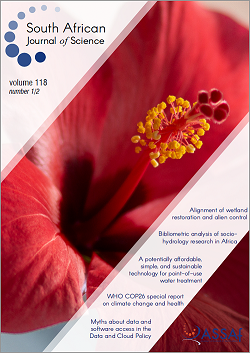Scope, trends and opportunities for socio-hydrology research in Africa: A bibliometric analysis
DOI:
https://doi.org/10.17159/sajs.2022/8742Keywords:
bibliometric, VOSviewer, Web of Science, Scopus, socio-hydrology, AfricaAbstract
Socio-hydrology research is concerned with the understanding of how humanity interacts with water resources. The purpose of this study was to assess the disparity between global and African trends as well as developments in the research domain of socio-hydrology. From the viewpoint of a multitude of research themes, multi-author collaborations between African and international researchers and the number of publications produced globally, the results reveal that the field of socio-hydrology is still underdeveloped and yet nascent. At a global level, the USA, China, and the Netherlands have the highest number of scientific publications, while in Africa, South Africa dominates, although these scientific publications are significantly much lower than the global output. The output of scientific publications on socio-hydrology research from Africa increased from 2016, with significant output reached in 2019. Water management and supply, hydrological modelling, flood monitoring as well as policies and decision-making, are some of the dominant themes found through keywords co-occurrence analysis. These main keywords may be considered as the foci of research in socio-hydrology. Although socio-hydrology research is still in the early stages of development in Africa, the cluster and emerging themes analysis provide opportunities for research in Africa that will underpin new frontiers of the research agenda encompassing topics such as the (1) impacts of climate change on socio-hydrology; (2) influence of socio-hydrology on water resources such as surface water and groundwater; (3) benefits of socio-hydrological models on river basins and (4) role of socio-hydrology in economic sectors such as agriculture. Overall, this study points to a need to advance socio-hydrology research in Africa in a bid to address pressing water crises that affect sustainable development as well as to understand the feedback mechanisms and linkages between water resources and different sectors of society.
Significance:
- The field of socio-hydrology is still under-researched in Africa.
- Limited research could be attributed to a lack of expertise, resources and data limitations
- Socio-hydrology research is likely to be strengthened through collaborations between Africa and other developed countries.
- Existing gaps present opportunities to advance socio-hydrology research in Africa.
Downloads
Published
Issue
Section
License

All articles are published under a Creative Commons Attribution 4.0 International Licence
Copyright is retained by the authors. Readers are welcome to reproduce, share and adapt the content without permission provided the source is attributed.
Disclaimer: The publisher and editors accept no responsibility for statements made by the authors
How to Cite
- Abstract 1187
- PDF 847
- EPUB 506
- XML 499
- Supplementary material 211












.png)